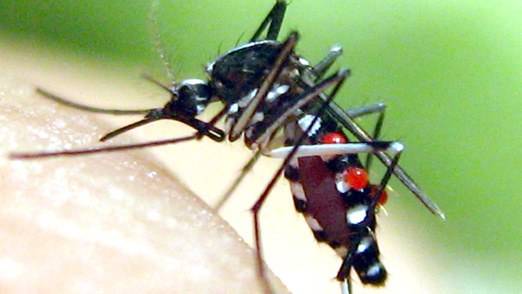Mosquito Spraying In Pennsauken And Merchantville Rescheduled

Due to inclement weather, mosquito sprayings scheduled for this week have been postponed and rescheduled. The Mosquito Control Commission will be in the community spraying and surveilling areas throughout Camden County, including Pennsauken and Merchantville. During the summer and fall months the commission schedules on an as-needed basis based upon the results of their surveillance efforts and input from the public.
“The incredible rain totals and associated flooding in the county this week made it necessary that spraying operations be postponed until next week,” said Freeholder Jeff Nash, liaison to the Camden County Mosquito Commission. “With all that rain, homeowners must remain vigilant. Mosquitoes need standing water to breed, and the risk for standing water to go unchecked is especially high when rains are severe and frequent as they have been. The simple act of eliminating standing water on your property can help reduce the pest population in your neighborhood, and assist the efforts of the Camden County Mosquito Control Commission.”
The Camden County Mosquito Commission will be conducting ULV “spraying” operations originally scheduled for June 20 on Thursday, June 27, between the hours of 2:00 – 6:00 a.m. in the following locations in Pennsauken, weather permitting:
- River Road
- Lennox Road
- June Road
- Stow Road
- Union Ave.
- Barrows Ave.
- Bannard Ave.
- Bridgeview Ave.
- John Tipton Blvd.
- Adam Ave.
- Zimmerman Ave.
- Derousse Ave.
- Morgan Ave.
- Curtis Ave.
- Velde Ave.
- Engard Ave.
- Delair Ave.
“The commission works with the Public Health Environmental Laboratories in Trenton to verify the presence of West Nile Virus and other communicable diseases in their samples,” Nash said. “If a pool tests positive, the Mosquito Commission returns to spray the area. The sprayings take place when the mosquitoes are most active.”
The mosquito spray is not harmful to humans or pets, but you should avoid direct contact if you have respiratory concerns or are sensitive to irritants.
Residents should check their property for any object that holds water for more than a few days. All pre-adult mosquito stages (eggs, larvae, and pupae) must be in stagnant water in order to develop into adult mosquitoes.
- Swimming pools are a common problem. All pools must be checked and maintained to keep them mosquito-free. Swimming pools can breed mosquitoes within days after you stop adding chlorine or other disinfectant. Pool covers can catch rainwater and become a mosquito development site. Add a little chlorine to kill mosquitoes.
- Maintain screens to prevent adult mosquitoes from entering your home or business.
- Personal protection is strongly urged if you are outside when mosquitoes may be active—generally dawn and dusk. Insect repellants containing between 10-35 percent DEET are very effective, however, be sure to follow the label directions and take extra precautions with children and infants.
The Camden County Mosquito Commission suggests checking around your yard for mosquito breeding containers. The following is a checklist of tips to help eliminate mosquito breeding:
- Dispose of unnecessary containers that hold water. Containers you wish to save turn upside down or put holes in the bottom so all water drains out.
- Lift up flowerpots and dump the water from the dish underneath every week.
- Stock fish or add mosquito larvicide to ornamental ponds.
- Change water in bird baths, fountains, and animal troughs weekly.
- Screen vents to septic and other water tanks.
- Store large boats so they drain and small boats upside down. If covered, keep the tarp tight so water does not pool on top of the tarp.
- Do not dump leaves or grass clippings into a catch basin or streams.
- Do not allow water to collect on sagging tarps or awnings.
- Do not allow trashcan lids to fill with water.
- Check downspouts that are able to hold enough water to allow mosquito larvae to mature.
“The incredible rain totals and associated flooding in the county this week made it necessary that spraying operations be postponed until next week,” said Freeholder Jeff Nash, liaison to the Camden County Mosquito Commission. “With all that rain, homeowners must remain vigilant. Mosquitos need standing water to breed, and the risk for standing water to go unchecked is especially high when rains are severe and frequent as they have been. The simple act of eliminating standing water on your property can help reduce the pest population in your neighborhood, and assist the efforts of the Camden County Mosquito Control Commission.”
The Camden County Mosquito Commission will be conducting ULV “spraying” operations originally scheduled for June 20 on Thursday, June 27, between the hours of 2:00 – 6:00 a.m. in the following locations in Pennsauken and Merchantville, weather permitting:
Pennsauken
- River Road
- Lennox Road
- June Road
- Stow Road
- Union Ave.
- Barrows Ave.
- Bannard Ave.
- Bridgeview Ave.
- John Tipton Blvd.
- Adam Ave.
- Zimmerman Ave.
- Derousse Ave.
- Morgan Ave.
- Curtis Ave.
- Velde Ave.
- Engard Ave.
- Delair Ave.
Merchantville
- Plymouth Place
- Somerset Ave.
- St. James Ave.
- Church Road
“The commission works with the Public Health Environmental Laboratories in Trenton to verify the presence of West Nile Virus and other communicable diseases in their samples,” Nash said. “If a pool tests positive, the Mosquito Commission returns to spray the area. The sprayings take place when the mosquitoes are most active.”
The mosquito spray is not harmful to humans or pets, but you should avoid direct contact if you have respiratory concerns or are sensitive to irritants.
Residents should check their property for any object that holds water for more than a few days. All pre-adult mosquito stages (eggs, larvae, and pupae) must be in stagnant water in order to develop into adult mosquitoes.
- Swimming pools are a common problem. All pools must be checked and maintained to keep them mosquito-free. Swimming pools can breed mosquitoes within days after you stop adding chlorine or other disinfectant. Pool covers can catch rainwater and become a mosquito development site. Add a little chlorine to kill mosquitoes.
- Maintain screens to prevent adult mosquitoes from entering your home or business.
- Personal protection is strongly urged if you are outside when mosquitoes may be active—generally dawn and dusk. Insect repellants containing between 10-35 percent DEET are very effective, however, be sure to follow the label directions and take extra precautions with children and infants.
The Camden County Mosquito Commission suggests checking around your yard for mosquito breeding containers. The following is a checklist of tips to help eliminate mosquito breeding:
- Dispose of unnecessary containers that hold water. Containers you wish to save turn upside down or put holes in the bottom so all water drains out.
- Lift up flowerpots and dump the water from the dish underneath every week.
- Stock fish or add mosquito larvicide to ornamental ponds.
- Change water in bird baths, fountains, and animal troughs weekly.
- Screen vents to septic and other water tanks.
- Store large boats so they drain and small boats upside down. If covered, keep the tarp tight so water does not pool on top of the tarp.
- Do not dump leaves or grass clippings into a catch basin or streams.
- Do not allow water to collect on sagging tarps or awnings.
- Do not allow trashcan lids to fill with water.
- >Check downspouts that are able to hold enough water to allow mosquito larvae to mature.
For more information, or to report a problem, contact the Camden County Mosquito Commission at (856) 566-2945 or skeeters@camdencounty.com.

